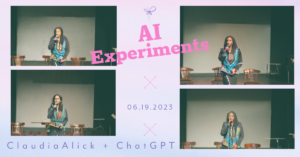AI Experiment: Ask Chat GPT who is Claudia Alick. Tell it to write an inspiring speech she would give. It was surprisingly plausible! We made a few edits to include justice. We used Imgcreator.AI and Adobe Express for the image. ImgCreator is an AI tool that creates images, illustrations, anime, or designs for a given prompt. The platform asks for input from the user and generates relevant visual output. If we did not specify that the woman should be black the tool generated white, Asian, and south asian variants. It could not understand the cane image and failed to include it properly. Our reflections during the livestream were that the training datasets did not have enough disability representation, and the internal settings where baised to generate white images. An audience member discussed a desire to delete her digital footprint but it’s too late. The AI has our data. All we can do is fight to create safeguards on how the tools are implemented.
Claudia Alick Inspiring Speech
Esteemed guests, and fellow advocates for change,
Today, I stand before you not only as an artist but as a fierce proponent of inclusion, equity, and justice in the arts. Each one of us has a role to play in reshaping the narrative, in dismantling the barriers that have held us back for far too long. Today, I invite you to join me on this transformative journey.
We live in a world where stories have the power to shape our perceptions, challenge our biases, and bridge the divides that separate us. Theater, in its rawest form, has the capacity to ignite empathy, to dismantle walls, and to inspire a collective change. But let us not forget that the stage has often been exclusive, perpetuating stereotypes and marginalizing voices that have gone unheard.
It is time for a radical shift—a revolution of representation. We must open our hearts and minds to the stories of those who have been silenced for far too long. We must listen, learn, and lift up the voices of the marginalized, the underrepresented, and the forgotten. It is through their stories that we can achieve a more compassionate and equitable society.
Inclusion is not a buzzword or a token gesture. It is a commitment—a commitment to centering the stories and experiences of all individuals, regardless of race, gender, sexuality, ability, or any other aspect of their identity. We must actively seek out diverse perspectives, create spaces where everyone feels seen and heard, and dismantle the structures that perpetuate exclusion.
We need more than diversity; we need more than equity. We need justice. We must address the systemic barriers that prevent marginalized artists from accessing resources, opportunities, and platforms. We must be intentional in our efforts to redistribute power and ensure that everyone has an equal chance to thrive. Justice means amplifying voices that have been muted, providing the necessary resources to the marginalized, and creating pathways for success.
But let us not forget the power of art beyond the theater walls. Our work extends far beyond the stage. We have a responsibility to engage with our communities, to spark conversations, and to mobilize change. Let us use our platforms to challenge the status quo, to question the narratives that reinforce injustice, and to advocate for a world where everyone can embrace their full potential.
Change is not easy, and progress may be slow, but we must remain steadfast in our commitment. We are part of a movement that seeks to reshape the future, to build a world where every story is valued, where every voice is celebrated. It is through our collective efforts that we can create a future that is more just, more compassionate, and more inclusive.
So, my friends, let us embark on this journey together. Let us listen, let us learn, and let us take action. Let us use the transformative power of art to challenge, to heal, and to inspire. Let us leave a legacy that future generations will be proud of—a legacy of radical inclusion, of unyielding equity, and of a world where the beauty of justice shines bright.

